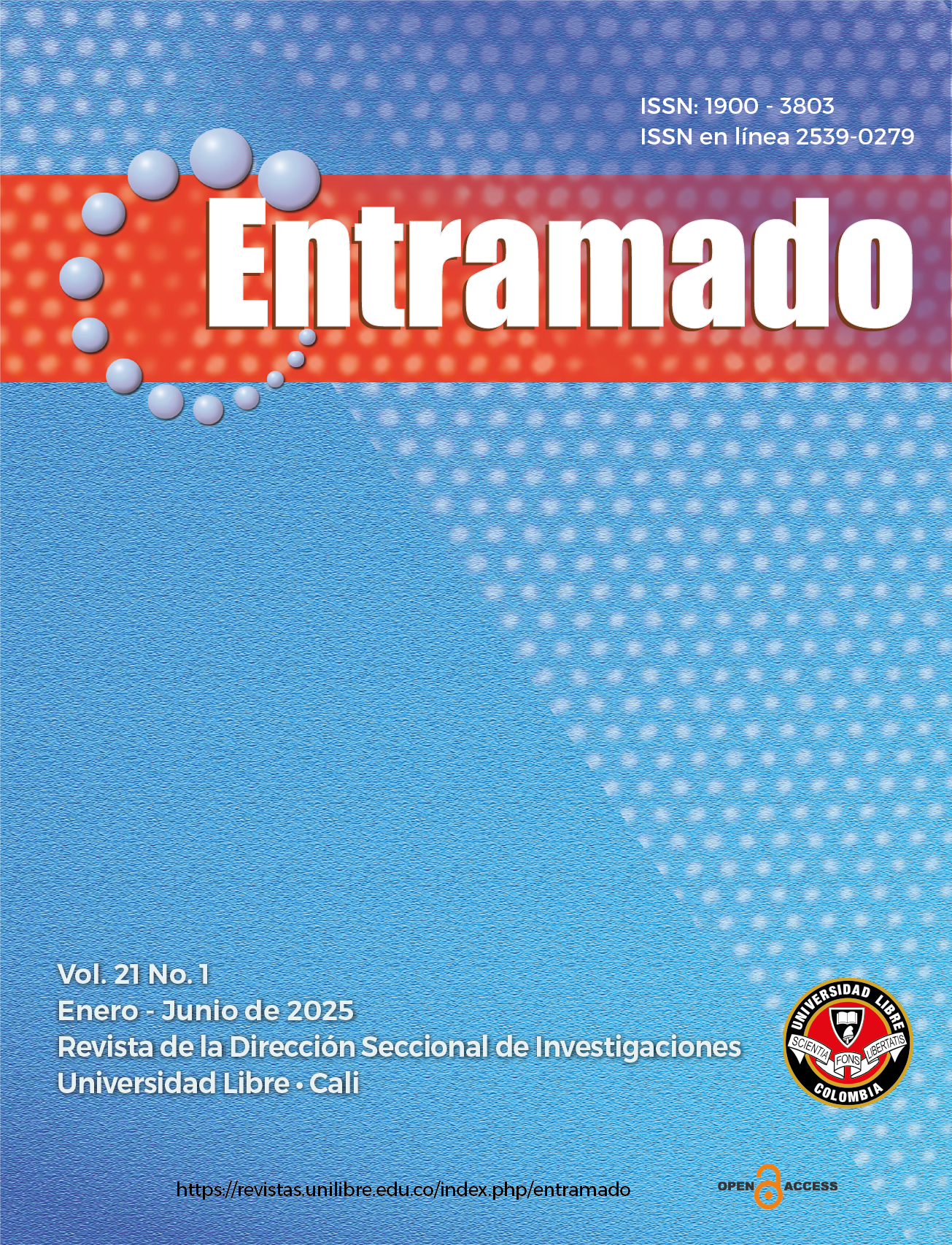Gestures for thinking the meeting with the other in education
DOI:
https://doi.org/10.18041/1900-3803/entramado.1.11194Keywords:
Education, Migration, Cultural diversity, MulticulturalismAbstract
This article's purpose is to display the minimal traces and gestures produced in the meeting with children, youths, and adult migrants from Venezuela, in school, and Medellin. These intertwined and tensed strokes produced gestures like ways of thinking, of folding and allowing unfolding in the meeting among strangeness, without abandoning the question of hospitality and hostility. From the perspective of post-qualitative research, in correspondence with the gleaning method, deployed the gesture of attentive listening, the singular answer, and the gesture of acceptance, which provides a contribution to education that makes possible the opening to the strange, to the strangeness, to the conclusive reality that we live in a permanent migration state. Therefore, we need to open our thoughts for developing the meetings with different cultures, recognizing and valuing each other and constructing from them, hosting the otherness like constitutive of the subject and the educational relationship.
Downloads
References
1. BARDET, Marie. “El cuerpo no ha estado ausente de la filosofía, sino que se convirtió en objeto”. Entrevistada por Melina Alexia Varnavoglou. Filosofía&Co, 2021b. https://www.filco.es/marie-bardet-filosofia-cuerpo/
2. BARDET, Marie. Presentación del libro: el cultivo de los gestos y hacer mundos con gestos. Presenta: Juanita Delgado [Vídeo]. YouTube, 2021a.
https://www.youtube.com/watch?v=vZgH2qRKWMs&ab_channel=MITAVun
3. CULLEN, Carlos. Perfiles ético-políticos de la educación. México d.f.: Paidós, 2004.
4. DELEUZE, Gilles. La Subjetivación: curso sobre Foucault. Tomo 3. 2.a ed. Buenos Aires: Editorial Cactus, 2020.
5. DELEUZE, Gilles; Guattari, Félix. Mil mesetas: capitalismo y esquizofrenia. Valencia: Pre-Textos, 2015.
6. DERRIDA, Jacques; Dufourmantelle, Anne. La hospitalidad. Buenos Aires: Ediciones de la Flor, 2017.
7. DUSCHATZKY, Silvia. Política de la escucha en la escuela. Buenos Aires: Editorial Paidós, 2017.
8. DUSCHATZKY, Silvia; SKLIAR, Carlos. Los nombres de los otros: narrando a los otros en la cultura y en la educación. En: LARROSA, Jorge; SKLIAR, Carlos (eds.). Habitantes de Babel políticas y poéticas de la diferencia. Barcelona: Laertes, 2001. P. 185-212.
9. HAUDRICOURT, André. El cultivo de los gestos: entre plantas, animales y humanos. En: BARDET, Marie. Hacer mundos con gestos. Editorial Cactus, 2019, P. 81-111.
10. HERNÁNDEZ-HERNÁNDEZ, Fernando; REVELLES-BENAVENTE, Beatriz. La perspectiva post-cualitativa en la investigación educativa: genealogía, movimientos, posibilidades y tensiones. En: Educatio Siglo XXI. 2019. Vol. 37, no. 2, p. 21-48. http://doi.org/10.6018/educatio.387001
11. LARROSA, Jorge; SKLIAR, Carlos. Babilonios somos: a modo de introducción. En: Habitantes de Babel políticas y poéticas de la diferencia. Barcelona: Laertes, 2001. P. 11-43.
12. MARTÍNEZ-BONAFE, Jaime. (2013). Utopía y educación popular: ¿cuáles son los buenos saberes de las buenas educadoras? En: II Seminario de Especialización Docente y Académica (15, mayo, 2013: Valencia). https://youtu.be/WL5NYpiS_6g
13. NANCY, Jean-Luc. A la escucha. Buenos Aires: Amorrortu, 2015.
14. PASSOS, Eduardo; KASTRUP, Virginia; ESCÓSSIA, Liliana da. (Orgs.). Pistas do método da cartografia: pesquisa-intervenção e produção de subjetividade. Porto Alegre: Editora Sulina, 2009.
15. PÉREZ DE LARA FERRE, Nuria. Identidad, diferencia, diversidad: mantener viva la pregunta. En: LARROSA, Jorge; SKLIAR, Carlos (eds.). Habitantes de Babel políticas y poéticas de la diferencia. Laertes, 2001. P. 291-316.
16. POIRIÉ, François; LÉVINAS, Emmanuel. Ensayo y conversaciones. Madrid: Arenas Libros, 2009.
17. Roldán, D. (2020). Agnés Varda: las claves para entender su cinescritura. Zoom f7. https://www.youtube.com/watch?v=x7iWxYfXhq0&ab_channel=Zoomf7.
18. SEGATO, Rita .(2020). La escucha: contra la importación acrítica de categorías. Podcast Facultad Libre.
https://www.youtube.com/watch?v=hE-YeFSpzAI&ab_channel=FacultadLibre
19. SKLIAR, Carlos. ¿Y si el otro no estuviera ahí? Notas para una pedagogía (improbable) de la diferencia. Madrid: Miño y Dávila, 2011.
20. SKLIAR, Carlos; TÉLLEZ, Magaldy. Conmover la educación: ensayos para una pedagogía de la diferencia. Buenos Aires: Noveduc, 2008.
21. UNIVERSIDAD DE SAN BUENAVENTURA. Doctorado en Ciencias de la Educación. 2021. https://www.usbmed.edu.co/Programas/Posgrados/Doctorado-en-Ciencias-de-la-Educacion
22. VARDA, Agnés. Los espigadores y la espigadora [Documental]. Francia: Ciné Tamaris, 2000.
23. VEIGA-NETO, Alfredo. Incluir para excluir. En: LARROSA, Jorge; SKLIAR, Carlos (eds.). Habitantes de Babel políticas y poéticas de la diferencia. Barcelona: Laertes, 2001. P. 165-184.
24. WALDENFELS, Bernhard. Exploraciones fenomenológicas acerca de lo extraño. Buenos Aires: Anthropos Editorial, 2015.
25. WALDENFELS, Bernhard. La pregunta por lo extraño. En: LOGOS. 1998. No. 32, p. 85-98.
26. ZAMBRANO, María. Notas de un método. Madrid: Mondadori, 1989.
Downloads
Published
Issue
Section
License
Copyright (c) 2024 Entramado

This work is licensed under a Creative Commons Attribution-NonCommercial-ShareAlike 4.0 International License.


